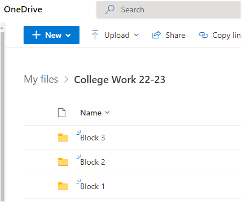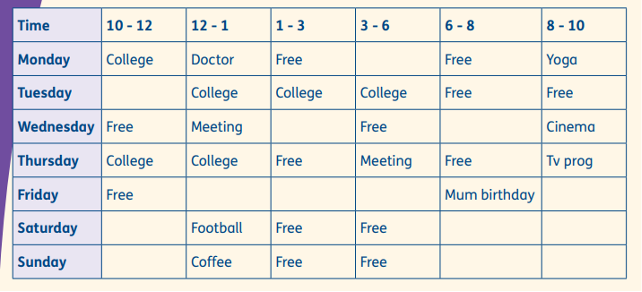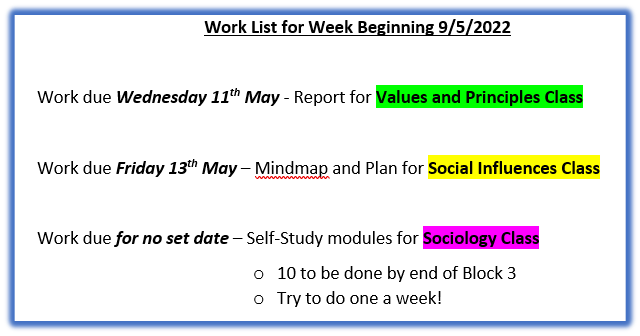Six Top Tips for Organising Your Work
Good study begins with good organisation – this guide will share some top tips on how to keep your work organised!
1. File your way to success
Filing systems are few people’s idea of fun – but they can save you a load of time.
Imagine two folders:
Folder One contains no labels or dividers. It is stuffed full of notes from different classes, completed essays, research material and course handouts. Everything in the folder gets mixed together and muddled up.
Folder Two is titled “Chemistry: Module One”. It only contains material from that class. A divider in the folder labelled “Notes” contains class notes only, filed in date order. There are also sections in the folder for Completed Essays, Tutor Notes, Worksheets and Research Material.
Which folder would you rather look for an old piece of work in or use to help you revise?
2. Computers should have filing systems, too!
A lot of work is now issued, stored and completed on computers.
The best place to save work is to a Cloud service like Microsoft’s OneDrive, which is part of your college Office 365 account (See Accessing any Office 365 App Guide for help logging in).
Clear file names and a folder structure are just as important on a computer. Why not set-up a folder called “College work 2022-2023”. Inside that folder you could have three more folders. Inside each “Block” folder you could list your different classes
- E.g. Numeracy, Communications, Digital Skills
Saving each piece of work in the right folder, with a clear name (e.g. “Essay on Job Experience” saved in the “Block 1” – “Communications” folder) means you will easily be able to find the file at a later date – exactly what you want!

3. A Suitable Study Space
What is the best place for you to study?
Some people work best at home, others in a library. Some study alone and in silence while others like company, music or background noise. You probably already have a good idea of what works for you
Once you’ve worked out what your “perfect study conditions” are, make sure you can regularly access these conditions:
- book slots in the library
- make sure distractions (like your phone!) are hidden away or put on silent so that you can focus to your best ability
- make friends and family aware that this is your study space and ask them not to interrupt!
4. Setting Aside Study Time
Studying for the right amount of time, at the right times, is another key to keeping organised and on top of work
Some people learn best in the mornings, others at night – so try to schedule your study for periods of the day when you know you will be productive.
Balance is also important. It’s hard to study effectively if that’s all you ever do. Keep time in your schedule for relaxing, seeing friends and family and managing other commitments, such as a job.
Creating a weekly study plan (like the one right [desktop] below [mobile]) can help you build time for college work into a healthy schedule
If you’d like help making a study plan speak to an Educational Support Worker

5. Be Productive!
So you’re in your ideal study space, looking at your study timetable, with your neatly organised folder open in front of you. What next?
Don’t procrastinate, make the most of your time!
Here are some tips from Dyslexia Scotland on how to be productive:
- Break study time down to 50 minutes and have a 10 minute break every hour.
- Don’t be put off by looking at a blank piece of paper: write the question or topic title and brainstorm some ideas. Pick a different job from your to-do list.
- Think positively. Say “Now I’m going to get this done” as you sit down rather than groaning “Oh no! Work again – I can’t do this”.
- Do something that needs to be done and doesn’t require much thought like references.
Some college-specific tips are:
- Have a look at your task instructions and check you know what to do
(if you don’t then message your lecturer or educational support worker for help) - Break the task down into steps and focus on one at a time – it will seem more manageable that way
- If you get stuck on something, try moving on to another section and coming back to the difficult part later – you may see it with fresh eyes and make a breakthrough!
6. Organising Around Deadlines
Organising your work is especially important when you have deadlines coming up. A simple way to keep on top of deadlines is to list upcoming tasks.
A simple task list like the above could be made once a week (perhaps in conjunction with Weekly Study Plan from point 4.)
The document will help you prioritise your work. For example:
- The early part of the student’s week could be spent completing the Report due for Wednesday
- Thursday and Friday would be spent on the Mindmap
- Doing at least one of the Self-Study modules would help them keep on top of longer term goals, too
You can score out tasks once you complete them – very satisfying!

Download / More Information
You can download this guide as a PDF below or you can click the link to read more of our Study Guides.